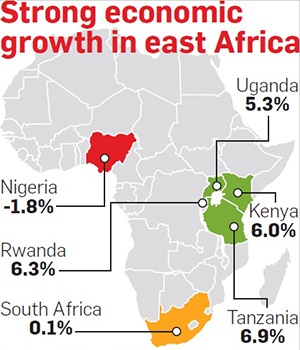
East African nations are playing an increasing role in driving growth on the world’s poorest continent as they ride a wave of cheap oil, slowing inflation and lower interest rates. Left behind: Former powerhouses Nigeria and South Africa.
The economies of Kenya, Rwanda, Tanzania and Uganda are all set to expand by more than 5% this year, International Monetary Fund (IMF) projections show.
Nigeria, struggling with weak crude prices, power outages and mismanagement of the currency, faces a 1.8% contraction.
South Africa is set to stagnate as it contends with political and labour turmoil and lacklustre demand for its minerals.
The bad news for commodity producers has been a boon for east Africa, which has done better at developing agriculture and manufacturing industries.
Low prices of energy and other inputs also have helped contain inflation and interest rates, in turn shoring up consumer spending.
The region is also reaping the benefits of an improved regulatory regime and increased investment in transport links and telecommunications.
“East African nations and other oil importers have largely been insulated from the slump currently being experienced by the big commodity producers,” said Stuart Culverhouse, chief economist at research firm Exotix Partners LLP in London, UK.
“The fact that they were unable to rely on behemoth industries also forced them to take some tough decisions and tough reforms earlier, and they are now reaping the benefits.” A growth spurt is visible in Kenya, east Africa’s biggest economy.
The government is spending $3.2 billion (R45.8 billion) on a rail link between the two main cities and the same amount on paving 10 000km of road by 2020.
Nairobi, the traffic-choked capital, is a giant construction site, with the value of approved building plans surging 41% in the first five months of the year. Giant cranes tower over the city as they raise glass-clad skyscrapers.
Rwanda is positioning itself as a regional financial and conference centre by cutting red tape, increasing high-speed internet access and improving roads and electricity supply.
Tanzania has begun tapping an estimated 58 trillion cubic feet of natural gas from offshore fields and intends using it to fire up new factories and commercial farms.
Uganda is gearing up to become an oil producer by 2020 and expects to attract $8 billion in investment from three offshore companies that have been issued production licences.
With Nigeria and South Africa accounting for about half of sub-Saharan Africa’s output, the boom in east Africa and a handful of small west African economies such as Ivory Coast and Senegal will not be enough to fully offset flagging growth for the region.
In July, the IMF forecast an expansion of just 1.6% this year – down from 3.3% in 2015 – and an annual average of 5.7% in the decade prior to that.
Africa’s growth potential has undergone a structural shift and is unlikely to replicate that heyday – largely the result of the commodity boom and some policy improvements that cannot be replicated – any time soon.
John Ashbourne, an economist at Capital Economics in London in the UK, expects the region’s economy to grow, on average, by about 4% annually for the next five to 10 years.
“The narrative of 6% growth as far as the eye can see, and Africa as a new China, is dead – or at least dying – but it was always a bit overblown.
“At the end of the day Africa is still huge and has a growing population and massive natural resources. There will always be opportunities,” he said.
Investor interest remains subdued for now. The MSCI EFM Africa Index of shares, excluding South Africa – where investors are using stocks to hedge against the rand – has dipped by 8.4% this year.
A gauge of stocks across 24 frontier markets has gained 8.5%.
Foreign direct investment into Africa fell to $71.3 billion last year, down from $88.5 billion in 2014, according to accounting firm EY. Kenya attracted 95 new projects – the second most after South Africa, which won 130 – while just 53 went to Nigeria, it said.
Investors tend to generalise more about sub-Saharan Africa than other regions and the prevailing negative sentiment makes it harder for east Africa to take growth to a new level, according to Razia Khan, head of Africa macro research at Standard Chartered in London.
“If the enthusiasm for the bigger economies has gone, it becomes much more difficult for the smaller economies, even if they are doing well,” she said.
South Africa is mired in political crisis: President Jacob Zuma and Finance Minister Pravin Gordhan are locking horns over who controls the Treasury and state-owned companies, while government and ruling party officials issue conflicting policy statements.
In Nigeria, the economy shrank for a second consecutive quarter in the three months through June, squeezed by weaker oil prices and declining output as militants destroyed energy installations in the Niger River delta.
Businesses have also been hamstrung by foreign currency shortages as the central bank has sought to peg the naira.
Nomura International economist Peter Attard Montalto sees countries such as Kenya, Tanzania and Rwanda outperforming Africa’s biggest economies until at least the end of next year. “East Africa has been chugging along nicely,” he said from London.
“That should continue, provided countries do not squander the advantages of lower energy prices and continue to effect reforms that attract investment.” – Bloomberg




 Publications
Publications
 Partners
Partners











